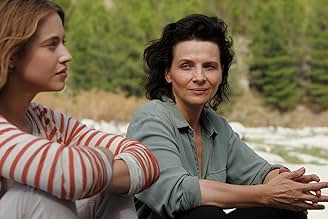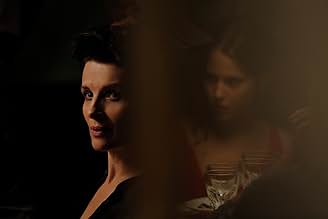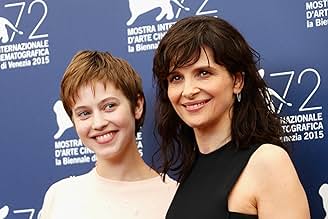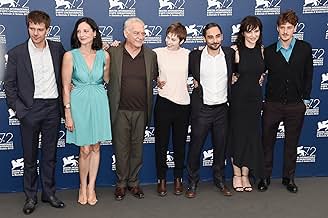IMDb-BEWERTUNG
6,5/10
2676
IHRE BEWERTUNG
Füge eine Handlung in deiner Sprache hinzuA mother unexpectedly meets her son's fiancée at a villa in Sicily and gets to know her as she waits for her son to arrive.A mother unexpectedly meets her son's fiancée at a villa in Sicily and gets to know her as she waits for her son to arrive.A mother unexpectedly meets her son's fiancée at a villa in Sicily and gets to know her as she waits for her son to arrive.
- Auszeichnungen
- 7 Gewinne & 9 Nominierungen insgesamt
Empfohlene Bewertungen
There is a kind of celebration that is cathartic and without it, grief can not release itself from its prison. In the space between loss and acceptance, lie denial and the hope for a miracle, for the light to shine through the heart.
In this extraordinary period of denial, time stretches into moments of grief, anger and hope, the meeting of reality with the loss of love is undefined, is fated to be revealed but if it can not, then the actions of those frozen in that vast expanse of waiting can not be predicted.
This is calm before the storm but the storm never arrives, it is the house that creaks with the stuff of haunting but the ghosts only wander into dreams.
L'attesa (The Wait) is shot in an old Sicilian villa, it moves in lingering pauses in which the exalted photographic beauty of this extended suspension, truth attempting to surface but underwater. Binoche carries the deepening mystery in precise nuanced expression. The nails hammered into the walls to shroud mirrors, the lime annointment of olive trees bleaches the trunk bone white, and awaiting the miracle, knowing in truth is freedom, unable to see past belief and hope.
Excellent film in every respect, music, photography and direction. Resolution is unavailable as the echoes of celebration fade.
In this extraordinary period of denial, time stretches into moments of grief, anger and hope, the meeting of reality with the loss of love is undefined, is fated to be revealed but if it can not, then the actions of those frozen in that vast expanse of waiting can not be predicted.
This is calm before the storm but the storm never arrives, it is the house that creaks with the stuff of haunting but the ghosts only wander into dreams.
L'attesa (The Wait) is shot in an old Sicilian villa, it moves in lingering pauses in which the exalted photographic beauty of this extended suspension, truth attempting to surface but underwater. Binoche carries the deepening mystery in precise nuanced expression. The nails hammered into the walls to shroud mirrors, the lime annointment of olive trees bleaches the trunk bone white, and awaiting the miracle, knowing in truth is freedom, unable to see past belief and hope.
Excellent film in every respect, music, photography and direction. Resolution is unavailable as the echoes of celebration fade.
"The Wait" ("L'Attesa") is a film that has really nice acting but the story itself didn't do much for me. Its vague ending left me cold and the behaviors of the leading lady, Anna (Juliet Binoche) just didn't make a lot of sense--regardless of what REALLY happened at the end.
When the film begins, Jeanne (Lou de Laâge) arrives at a Sicilian villa and instead of being greeted, she's given a meal by a servant and then retires to bed without seeing the woman of the house, Anna. The next day, Jeanne comes downstairs and finds that there's been some sort of funeral...and Jeanne tells her it's because her brother died...though it's pretty obvious that this might NOT be the truth. Jeanne has come to see Anna's son and spend her vacation with him....but through the course of the film, the son never arrives and Jeanne is feeling abandoned...though Anna and her seem to have a few moments together bonding.
Where does all this go? Well, as I mentioned above, the ending is a bit vague and it's easy to see two very different interpretations. I didn't really care about either one because Anna's actions simply didn't make much sense....and because of that the film lost me. Well acted, this film needed some better writing as the characters didn't always seem realistic or believable.
When the film begins, Jeanne (Lou de Laâge) arrives at a Sicilian villa and instead of being greeted, she's given a meal by a servant and then retires to bed without seeing the woman of the house, Anna. The next day, Jeanne comes downstairs and finds that there's been some sort of funeral...and Jeanne tells her it's because her brother died...though it's pretty obvious that this might NOT be the truth. Jeanne has come to see Anna's son and spend her vacation with him....but through the course of the film, the son never arrives and Jeanne is feeling abandoned...though Anna and her seem to have a few moments together bonding.
Where does all this go? Well, as I mentioned above, the ending is a bit vague and it's easy to see two very different interpretations. I didn't really care about either one because Anna's actions simply didn't make much sense....and because of that the film lost me. Well acted, this film needed some better writing as the characters didn't always seem realistic or believable.
Plot and character are the classic drivers of cinema but there are other forces of equal impact. Some films are driven more by what does not happen than what does, and photographic technique can transform inaction into deep meaning. This is the case in The Wait (2016), a film title that describes both the story's narrative arc and how it will be experienced by most viewers. Long silent close-ups that record little more than an eyebrow muscle tightening or the strands of hair on a neck are used to convey emotional power of surprising intensity.
Based entirely on the interaction between two women and the inability of one to reveal a painful truth to the other, the plot and character range is unusually sparse. The story opens with a funeral and the palpable raw grief on the face of a mother who has lost a son. Anna (Juliette Binoche) is in a deep dark place when she takes a call from beautiful young Jeanne (Lou de Laage) who asks why her son Giuseppe did not meet her at the airport. Anna invites Jeanne to wait for him at the Sicilian family villa, knowing he will never come. The pair move from a strained and awkward start to a warm friendship, all the while with Jeanne confused and Anna struggling with suppressed emotional turmoil. Anna has Giuseppe's cell phone and listens to Jeanne's desperate calls to her son, but withholding the truth gives him a tangible presence that keeps him alive and eases Anna's pain. For as long as she can gaze upon Jeanne, she can see through her dead son's eyes and share his delight in her innocence and charm.
This story rests entirely on the extraordinary ability of its two stars to convey the full gamut of emotion with total authenticity. The face of Binoche in particular is like a canvas onto which she paints every colour of the rainbow, with subtle shifts of expression that span joyful laughter to the very edge of sanity. Many viewers will find this a difficult film to watch because of the gradually escalating tension created by Anna holding back the truth from Jeanne, and this transforms the drama into a psychological thriller. It is impossible not to judge Anna or not to consider how we would handle such a situation, and this self-reflective process only heightens tensions both inside the film and within ourselves. The performances could easily have slipped into a melodrama, but instead, the minimalist dialogue and slow pace creates an open space into which is hung a finely wrought portrait of parental grief.
Based entirely on the interaction between two women and the inability of one to reveal a painful truth to the other, the plot and character range is unusually sparse. The story opens with a funeral and the palpable raw grief on the face of a mother who has lost a son. Anna (Juliette Binoche) is in a deep dark place when she takes a call from beautiful young Jeanne (Lou de Laage) who asks why her son Giuseppe did not meet her at the airport. Anna invites Jeanne to wait for him at the Sicilian family villa, knowing he will never come. The pair move from a strained and awkward start to a warm friendship, all the while with Jeanne confused and Anna struggling with suppressed emotional turmoil. Anna has Giuseppe's cell phone and listens to Jeanne's desperate calls to her son, but withholding the truth gives him a tangible presence that keeps him alive and eases Anna's pain. For as long as she can gaze upon Jeanne, she can see through her dead son's eyes and share his delight in her innocence and charm.
This story rests entirely on the extraordinary ability of its two stars to convey the full gamut of emotion with total authenticity. The face of Binoche in particular is like a canvas onto which she paints every colour of the rainbow, with subtle shifts of expression that span joyful laughter to the very edge of sanity. Many viewers will find this a difficult film to watch because of the gradually escalating tension created by Anna holding back the truth from Jeanne, and this transforms the drama into a psychological thriller. It is impossible not to judge Anna or not to consider how we would handle such a situation, and this self-reflective process only heightens tensions both inside the film and within ourselves. The performances could easily have slipped into a melodrama, but instead, the minimalist dialogue and slow pace creates an open space into which is hung a finely wrought portrait of parental grief.
Too slow, borderline unwatchable. It's 100 minutes but it felt at least 150. It should have been at least 20 minutes shorter. The worst thing is that it plays like a mystery, and there are no mysteries here, even though director tries hard to make it a bit enigmatic and cryptic. If it was a "pure" drama movie, without the "mystery" element, it could have been a good, even great. Because there are positives here, it's well acted and well directed. Juliette Binoche is so charismatic that she almost turns this boredom into an interesting movie. Furthermore, cinematography is nice and overall, movie's technical aspects are above average.
Yet, it's a failure. This could have been good because Binoche's motives for doing what she did, are crystal clear to me. I understood what she's going through and why she behaves like this. But still, the mystery element is unnecessary.
Ending was great.
Yet, it's a failure. This could have been good because Binoche's motives for doing what she did, are crystal clear to me. I understood what she's going through and why she behaves like this. But still, the mystery element is unnecessary.
Ending was great.
I've seen it as a part of Italian Cinema Festival in Lisbon, the director was there. To the end I wondered how this relatively young man could make it - bring a spectator in the intersection of sorrow, enchantment and tension and keep him there the whole film.
There was a lot of wondering in general - during and after, - a lot of associations and interpretations. The film keeps you very alive in spite of difficult theme, awaken, wanting something from the characters, wanting to be like the characters, asking questions, enjoying slow beautiful shots, colors, landscapes, soundtrack, actresses. Remembering other roles of Juliette Binoche as in "Three colors: Blue" and "Paris, je t'aime", other astonishingly beautiful Italian films like "Stealing beauty". Wishing it to resolute and stop and to continue after titles.
J.S. Foer said "humorous is the only way to tell a sad story". "L 'attesa" with very convincing vitality states that the only way to tell a sad story is beautiful.
There was a lot of wondering in general - during and after, - a lot of associations and interpretations. The film keeps you very alive in spite of difficult theme, awaken, wanting something from the characters, wanting to be like the characters, asking questions, enjoying slow beautiful shots, colors, landscapes, soundtrack, actresses. Remembering other roles of Juliette Binoche as in "Three colors: Blue" and "Paris, je t'aime", other astonishingly beautiful Italian films like "Stealing beauty". Wishing it to resolute and stop and to continue after titles.
J.S. Foer said "humorous is the only way to tell a sad story". "L 'attesa" with very convincing vitality states that the only way to tell a sad story is beautiful.
Wusstest du schon
- Wissenswertes"L'attesa" is a period of time whose duration is unknown and therefore it symbolizes a real act of faith. In this case, this act for Anna and Jeanne consists in waiting for the return of Giuseppe, the son of Anna and Jeanne's boyfriend, with the difference that the first knows the truth, while the second lives in the mystery. The return of Giuseppe takes on the meaning of a miracle. The song "Waiting for the miracle" emphasizes this detail.
- PatzerAbout one half hour into the movie Binoche cracks an egg into a frying pan, thereby breaking the yolk. However, when she serves it to her son's girlfriend the yolk is whole.
- Zitate
Anna Remigi: Jealousy means that there is still desire.
- VerbindungenFeatures Arrangiatevi (1959)
- SoundtracksOrchestral Loop
Music by Ben Lukas Boysen
Published by Erased Tapes Music
Top-Auswahl
Melde dich zum Bewerten an und greife auf die Watchlist für personalisierte Empfehlungen zu.
- How long is L'attesa?Powered by Alexa
Details
Box Office
- Budget
- 3.200.850 € (geschätzt)
- Bruttoertrag in den USA und Kanada
- 55.804 $
- Eröffnungswochenende in den USA und in Kanada
- 5.686 $
- 1. Mai 2016
- Weltweiter Bruttoertrag
- 1.010.766 $
- Laufzeit
- 1 Std. 40 Min.(100 min)
- Farbe
- Seitenverhältnis
- 2.35 : 1
Zu dieser Seite beitragen
Bearbeitung vorschlagen oder fehlenden Inhalt hinzufügen





























